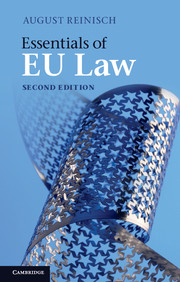Book contents
- Frontmatter
- Contents
- Preface
- Abbreviations
- 1 History of European integration
- 2 The institutional framework
- 3 The making of Union law
- 4 The effect of Union law
- 5 Judicial control within the Union
- 6 Protecting fundamental rights within the EU
- 7 The free movement of goods
- 8 The free movement of persons
- 9 EU competition law
- 10 Selected EU policies
- 11 The EU as an international actor
- Index
9 - EU competition law
Published online by Cambridge University Press: 05 November 2012
- Frontmatter
- Contents
- Preface
- Abbreviations
- 1 History of European integration
- 2 The institutional framework
- 3 The making of Union law
- 4 The effect of Union law
- 5 Judicial control within the Union
- 6 Protecting fundamental rights within the EU
- 7 The free movement of goods
- 8 The free movement of persons
- 9 EU competition law
- 10 Selected EU policies
- 11 The EU as an international actor
- Index
Summary
In a technical sense, EU competition policy covers what is known in many countries as cartel law or, in the United States, ‘anti-trust law’. The latter term was adopted because in the late nineteenth century, when anti-trust law was ‘invented’, most American cartels were established in the form of trusts. EU competition law rests on the triad of a cartel ban contained in Article 101 TFEU (ex Article 81 TEC), a prohibition on market abuse in Article 102 TFEU (ex Article 82 TEC) and merger control legislation. All three branches of EU competition law are handled by DG IV, now DG Competition, as the Directorate-General for Competition supporting the responsible Commissioner for Competition is known.
In a broader sense, other Union law also contributes to the overall aim of creating conditions for fair competition within the EU’s internal market. These include:
treaty provisions on free movement as a framework prohibiting mainly public restrictions on the free circulation of goods and services, such as duties and quantitative restrictions and their equivalent counterparts;
special competition rules for public undertakings in Article 106 TFEU (ex Article 86 TEC); and
the identification and justification or elimination of subsidies provided for in the state aid provisions of Articles 107–109 TFEU (ex Articles 87–89 TEC).
- Type
- Chapter
- Information
- Essentials of EU Law , pp. 170 - 208Publisher: Cambridge University PressPrint publication year: 2012



